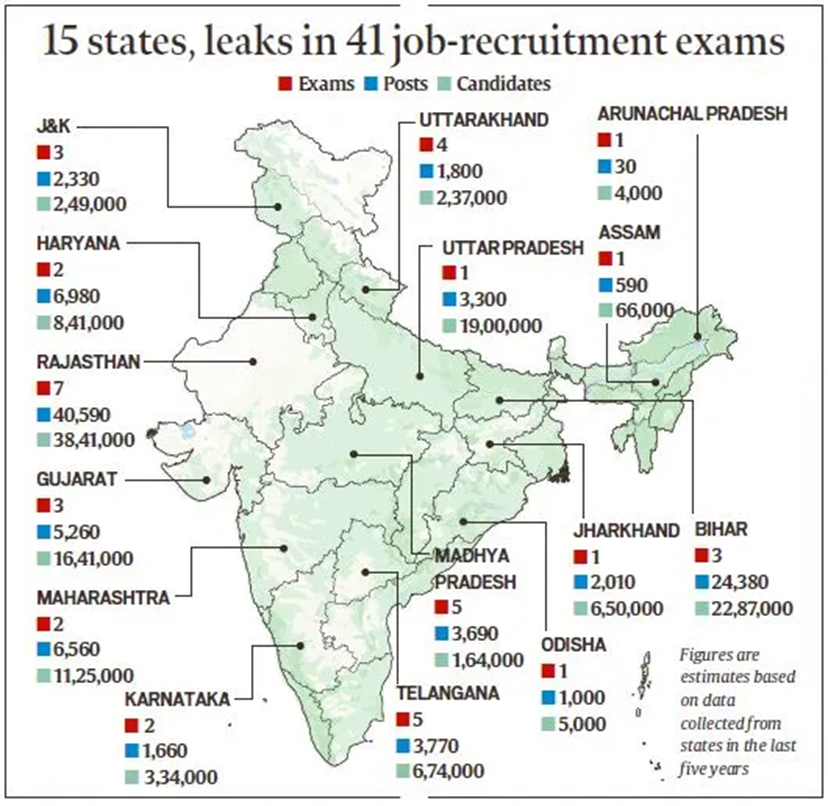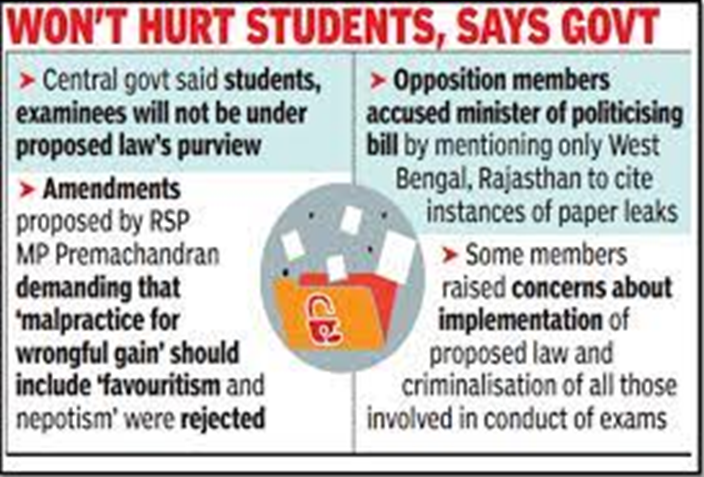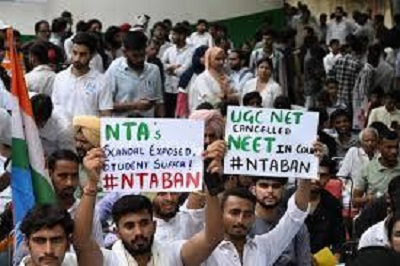Context-
In 2017, the Government of India established the National Testing Agency (NTA) to conduct entrance examinations for professional courses. The vision was to create an agency that would administer multiple choice question (MCQ)-type exams electronically, using specialists in testing science to develop question banks, evaluation frameworks, and organizational expertise. Today, the NTA conducts over 15 entrance examinations for higher education institutions, including the Common University Entrance Test (CUET) for central university admissions and post-graduate admissions in medical and University Grants Commission (UGC) courses. However, despite these ambitions, the NTA has faced significant challenges and criticism.
The NTA's Implementation Challenges
Contrary to its intended digital and streamlined format, the NTA conducts many examinations in pen-and-paper mode. This approach introduces numerous opportunities for malpractice at various stages, from paper setting and printing to distribution and delivery. This year’s conduct of the National Eligibility cum Entrance Test (Undergraduate), or NEET-UG, for undergraduate medical admissions, highlighted these issues, leading to widespread dismay and a complete loss of trust in the NTA's ability to administer fair exams.

Issue with NEET-UG
NEET-UG was created to standardize the quality of students aspiring to become doctors, given the varying standards of school boards across India. However, the implementation has been marred by several problems, including widespread question paper leaks, arbitrary grace mark awards, selective re-examinations, and rank manipulations. These issues have rendered the process murky and unreliable.
The government's response to the NEET-UG issues needs to be revised. Instead of ordering a re-examination, which would have been the most straightforward and fair solution, there has been a series of tampering with results. This has only deepened distrust and raised more questions about the NTA's capability to conduct fair exams. The Supreme Court of India has intervened, hearing petitions on this matter, while the government plans to start the counseling process for admissions. The integrity of ranks in NEET-UG is critical as they determine admissions to government institutions, which offer quality education at subsidized rates. The abysmally low cut-off percentages in previous years (19%-22%) highlight the systemic issues and the need for urgent reflection.
The High-Level Committee's Mandate & Bill
In response to the NTA's failures, the government has formed a seven-member high-level committee of experts chaired by former Indian Space Research Organisation chairman, K. Radhakrishnan. The committee's mandate includes:
● Reforming the examination process to prevent breaches.
● Reviewing and improving data security protocols.
● Suggesting monitoring mechanisms.
● Making recommendations on the NTA’s structure and functioning.
● Defining roles and responsibilities at all levels.
● Establishing a responsive grievance redress mechanism.
These basic issues should have been addressed when the NTA was initially formed, indicating a collapse in the governance mechanism.
The Public Examinations (Prevention of Unfair Means) Bill, 2024, introduced in the Lok Sabha, aims to enhance the transparency, fairness, and credibility of the public examinations system in India. Once enacted, it will also serve as a model draft for states to adopt at their discretion, promoting uniformity and consistency in examination practices nationwide.

Decentralization as a Workable Option
The pervasive cheating and leakages in national-level exams necessitate a review of the centralized testing mechanism for higher education institutions. One viable option is to decentralize the examination process. The central government could restrict testing to its own institutions while states could conduct entrance examinations for their institutions based on a standard template. This template, prepared by the central government, would ensure requisite standards are maintained.
Decentralizing the examination process could reduce risks and prevent vested interests and criminal elements from undermining the system. Testing bodies should incorporate domain experts, testing experts, and robust IT measures to ensure fairness and security in large-scale exams.
Rejuvenating the Schooling System
Amidst concerns about the integrity of national or state-level examinations, the gradual degradation of the school system has been overlooked. The rise of national-level entrance exams for professional and university courses has rendered school-leaving examinations redundant, leading to the emergence of ‘dummy’ schools and a proliferation of coaching centers focused solely on entrance exam preparation.
This trend has damaged the schooling system, and there is an urgent need to restore the value of school education. One solution is to reintroduce a percentage of school-leaving marks into the final score of entrance exams. This approach, previously used in the Indian Institutes of Technology entrance exams, was abandoned without sufficient debate. Ensuring merit based on good school education is crucial to prevent further decay of the schooling system.
Conclusion
The centralized testing mechanism for higher education institutions requires a thorough review. The failures of the NTA in conducting fair exams, particularly the NEET-UG, have highlighted systemic issues and a loss of trust. Decentralizing the examination process and incorporating robust security and evaluation measures could address some of these challenges. Additionally, rejuvenating the schooling system by integrating school-leaving marks into entrance exams is essential to maintain academic standards and values. Addressing these issues urgently is crucial for safeguarding the integrity of India's education system.
|
Probable Questions for UPSC Mains Exam-
|
Source- The Hindu







